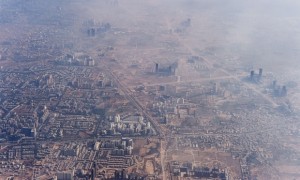By: Tiffany Walker
Climate Change has been a hot topic for at least the last ten years, and debates have only increased in urgency. However, most researchers are not attempting to link climate change to human conflict. In 2007, Ban Ki-moon, United Nations Secretary General, described the conflict in Darfur as the first climate change conflict. The assumption was that the conflict was perpetuated by the lack of water resulting from changed rainfall patterns—a side effect of climate change.
Researchers at Stanford, Sol Hsaing and Marshall Burke, conducted an analysis of fifty historical studies on conflict and climate change. The researchers found that a 1 percent increase in temperature leads to a 4.5 percent increase in civil war within that year. Moreover, the researchers argued that the conflict will also derive from economic problems resulting from temperature related declines in agrarian societies.
The head of the United Nations University Institute of Sustainability and Peace’s Peace and Security Section, Dr. Vesselin Popovski claims that there is an indirect link between climate change and human conflict. Hsiang wrote that there is not proof that any conflict can be solely attributed to climate change, but climate change is a critical factor in how events escalate even to the point of violence.
Defense Secretary Chuck Hagel has stated that events of climate change, such as increasing temperatures, changing precipitation patterns, rising sea levels, have the potential to intensify global instability and conflict. The Pentagon has begun to take the idea of “climate wars” seriously.
Research may still be lagging in the area of climate change in accordance with conflict, but the idea does not seem so ridiculous. Climate change can intensify regional droughts, hurt agricultural production, and limit access to clean drinking water. People and nations have gone to war over less important things. Why wouldn’t they go to war over water or food?

